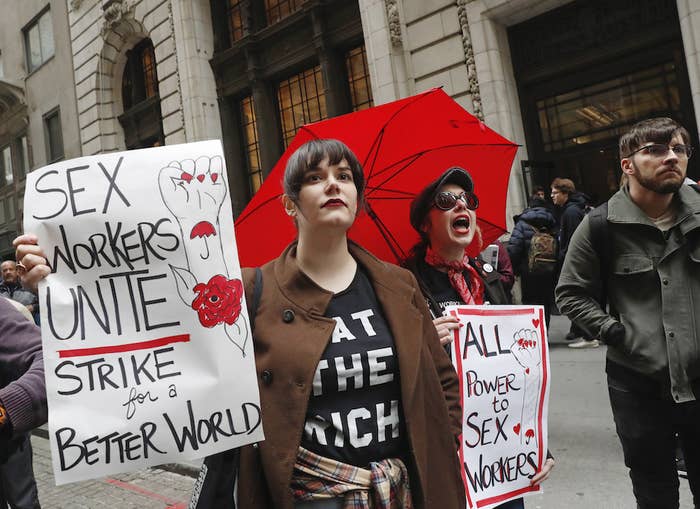
Congressional Democrats filed a bill on Tuesday to study the safety of sex workers — an attempt to figure out if Congress’s own crackdown on sex trafficking websites has caused dangerous ramifications.
“As lawmakers, we are responsible for examining unintended consequences of all legislation,” Democratic Sen. Elizabeth Warren, a sponsor of the bill, said in a statement on Tuesday.
But Warren, a presidential candidate, voted for the anti-trafficking bill known as FOSTA-SESTA that she now worries may be problematic. She said her duty to study the law “includes any impact [FOSTA-SESTA] may have had on the ability of sex workers to protect themselves from physical or financial abuse.”
Trouble began when Congress rushed through legislation in early 2018 called the Stop Enabling Sex Traffickers Act and the Allow States and Victims to Fight Online Sex Trafficking Act.
The bipartisan measure was designed to undermine human traffickers by prohibiting online platforms used for the trade. But in the process, FOSTA-SESTA also outlawed the networks that many sex workers used to screen clients, form protective social structures, and look out for one another. The bill filed Thursday reports that FOSTA-SESTA has made sex workers more vulnerable to predators on the street.
“Sex workers have reported a reduced ability to screen potential clients for safety, and negotiate for boundaries such as condom use, resulting in 14 reports of physical and sexual violence,” said the legislation.
Led by Rep. Ro Khanna in the House, the nine-page bill would attempt to study the actual fallout — or benefits — of FOSTA-SESTA, thereby possibly giving lawmakers justification to amend or repeal the law.
"I think it's really courageous for Sen. Warren to support this," Khanna said, saying he understood lawmakers may fear being branded as pro–sex work. "Some people are worried about a 30-second attack ad."
This bill had 10 cosponsors on Tuesday between the House and Senate, including Sen. Bernie Sanders, Khanna told BuzzFeed News. He plans to find more cosponsors in the new year.
BuzzFeed News reported in September that the bill was forthcoming and is seen by advocates as a first step toward legalizing sex work outright.
Dubbed as the Safe Sex Workers Study Act, the measure would require the Department of Health and Human Services to study the health and safety of sex workers. HHS would work in consultation with the National Institutes of Health, CDC, and the Substance Abuse and Mental Health Services Administration. The agencies would report their findings to Congress.
The agencies would be be charged with studying how FOSTA-SESTA impacts “consensual, transactional sex” in the absence of interactive computer services, such as the shuttering of Backpage.com. The agencies would be tasked with looking into the rate of violence against sex workers, the ability of those workers to negotiate terms with clients, their experiences with exploitation, and their interactions with law enforcement.
The bill is cosponsored in the House by Rep. Barbara Lee of California and in the Senate by Ron Wyden of Oregon.
Khanna said it was critical to understand FOSTA-SESTA's impact on people of color, transgender people, and "the increased rates of violence they're facing."
But even as some politicians have been increasingly open to debating the criminality of sex work, including on the campaign trail, plenty of congressional Democrats are reluctant to get behind the issue publicly.
BuzzFeed News sat in on a meeting this summer with Kate D’Adamo, an advocate for the new study bill, and a Democratic lawmaker’s staff. “The Congress member understands, you know, the harms that the bill that was signed into law has done,” the aide said in the meeting. “But I can’t see the Congress member coming out publicly and supporting this, just because I feel that we would get a lot of backlash in the district.”
The aide added: “We definitely have people in our district that are against legalizing or making sex work the norm.”
Democrats ostensibly champion LGBTQ people and women of color who often bear the brunt of poverty and violence — populations far more likely to rely on the sex trade to pay rent — but stigma around sex work has made decriminalization, and even research, a third-rail issue for some lawmakers.
Democratic voters, however, are leaning to decriminalize sex work outright. This year, a poll by Decrim NY and Data for Progress found that 56% of Democratic voters nationally support decriminalizing sex work (more than three times the number opposed); another poll, by Whitman Insight Strategies and BuzzFeed News, found 83% of LGBTQ people support decriminalizing sex work involving consenting adults.
“Many sex workers have turned to street-based work, which has historically involved higher rates of violence than other forms of transactional sex,” the bill filed Tuesday said of the FOSTA-SESTA fallout. “Street-based sex workers have frequently noted practices which harm their health and safety, such as the confiscation of condoms by police or use of condoms as evidence of arrest for prostitution.”
Originally, Khanna had wanted a bill to repeal FOSTA-SESTA outright, but sex worker advocates shaped a more viable approach. "The advocates, Kate D'Adamo and others, had a better strategy," he said. "If you try to repeal it, we will only get a handful of votes. A better approach is to study it."
But Khanna said he does hope this is a step to outright decriminalization — he wants human trafficking criminally punished but thinks consensual sex work between adults should be legal and regulated. "That is my personal position," he said. "I don't know if that's the position necessarily of any other sponsor."
